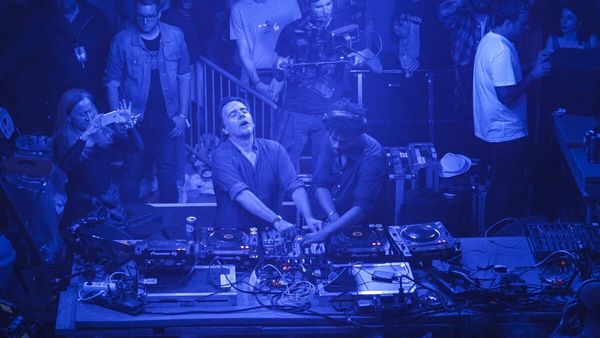Eye For Film >> Movies >> Laurent Garnier: Off The Record (2021) Film Review
Laurent Garnier: Off The Record
Reviewed by: Andrew Robertson

An affectionate and considerate portrait of Laurent Garnier, "techno superstar", godfather of electro française, techno promoter and festival favourite, and, among the film's many surprises, former waiter.
Not just anywhere, however, in the French Embassy in London, in the same febrile late 80s that fostered the Rebel Dykes. In a documentary whose camera prowls with zoom and track through city streets underneath electronic beats we range more widely than that, more quickly than feet will carry us.

London, New York, Paris, Tblisi, what everyone's talking about isn't easy. There's a demonstration of a Roland TR-909 that takes that programmable percussion and makes music with it. In and among dozens of numbers, those 303s, 808s, the 707s that made international travel cheap enough to move sounds from city to city to city. Moving important too as one of the elements we see is Garnier's record collection, so large it is described in linear meters of genre(s), first seen on the back of a trailer pulled by a vintage Massey-Ferguson tractor.
That mixture of the pastoral, the industrial, the nostalgic and the transporting is indicative. For sure there's your strobe lighting (warning potentially applies) and skylines, your neons and snowcaps, the sweat and the sour. There's not just the fight against electronic music that was prosecuted by authorities on either side of the channel through the late 80s and early nineties, your "repetitive" repression of raves that informs films like Beats. There's current fights, ongoing ones. A paramilitary raid leading to protests, the long legacy of LGBTQ+ and dancefloors from disco on.
There might not be much here to interest people not already aware of Garnier and his work. As an individual's story it's a fascinating one, as a slice of the development of dance culture, something international, inclusive, intersectional, interesting it's definitely more. While it sets Laurent's story firmly within the development of the genre, the industry, from the first superclubs to the point where he sits with schoolchildren and helps them with their art projects, where that all sits within the wider world isn't always clear.
It does explore to some extent how what was extreme has been normalised. There's a throughline from an open door and an empty dancefloor and the reflected light of the mirrorball and the sounds of Donna Summer and Georgio Moroder to Knight of the Legion of Honour. There's speculation as to the future, but the processes that bring us from past to present are not always clear. Some of these names that the music they call house holds dear are not household names, but grounding them in gigs played and records sold might overemphasise the commercial. Yet it's that commercial success, that generational shift, that gets us to now. Laurent's quote is repeated, that "house music is the music [he] was waiting for", but while the genres that fostered it are named they're not placed upon a family tree.
If you're already familiar with club culture, if you've read Bill Brewster's and Frank Broughton's Last Night A DJ Saved My Life you'll know some of this. That last is now 22 years old though, and there's a lot of loops under the bridge since. Garnier's success within genre is notable, noteworthy, not to be missed if you're already a fan, but in many places it feels like it could do with more context.
There are some artefacts of coronavirus delay. Marea Stamper changed her stage name to 'the Blessed Madonna' last year, and 18 months and change of closed nightclubs mean the sweaty masses on various floors look more alien to now than they might have to the 80s. Mass may also be appropriate not just for the religious overtones but the sense of crowd. The project was backed by 2,715 folk on Kickstarter, back in 2019. There were also gigs ticketed through Eventbrite, one in London, one in Brussels. All those folk are listed in the credits, so it's as well that there's a good tune (or two) to keep us interested through it. Not soundtrack alone, of course - there's also a speech, and quite an important one.
This is not director Gabin Rivoire's first documentary, but any chronicler might have issues with impartiality when the subject of the story is so involved. There are scores of interviewed figures, all sorts of tall tales, but the line between biography and hagiography can be a slim one. Though here some of the stories are less saintly than near supernatural. Even with the energy of use the punishing schedule Garnier set himself during his national service makes me exhausted even to recall it.
At 90 minutes it builds and sustains well, but there would be room and patience both for more. There's mention of festivals, the rise of the superstar DJ and we do hear from Carl Cox. There's some discussion of the focus changing from promoter (or, as with Leigh Bowery, guest) to DJ, but how big those names became is missing. By implication, obviously enough to get a documentary made about them, but for all the names it doesn't quite make clear how one becomes one. Hard work, certainly, which this film isn't, but it doesn't quite get the job done. As enjoyable as it is as a groove, it feels like waiting for a beat that never quite drops.
Reviewed on: 20 Aug 2021















